News & Stories
2018
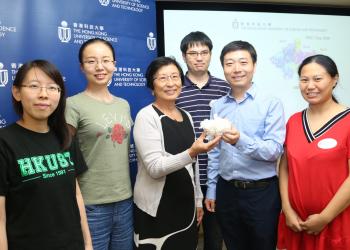
News
HKUST Scientists Determine Atomic Structure of DNA Replication Machine to Make Groundbreaking Discovery of DNA Replication Mechanism
Cells propagate by making copies of themselves through replicating their DNA genome, which are blueprints of their identities. Every full grown human came from a single fertilized egg cell whose genome is replicated approximately 10 million-billion times. What does the molecular machine that carries out this Herculean task look like? A research team led by scientists from the Hong Kong University of Science and Technology (HKUST) have determined the three dimensional structure of the DNA replication machinery at atomic resolution for the first time in history.
When DNA replication was first proposed based on its double helix structure over half a century ago, many believed that deciphering the machine that separates the two strands of DNA for replication is near to come. However, it turns out to be a much complicated task due to the large size, multi-partite nature (made up of three engines) and its flexibility of the machine.
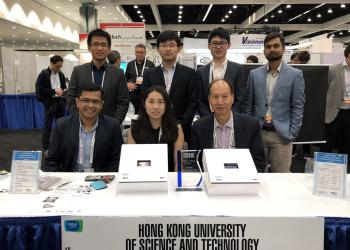
News
HKUST Develops a New Generation of LCD with Higher Efficiency, Resolution and Color Performance
A research team from the State Key Laboratory on Advanced Displays and Optoelectronics Technologies of The Hong Kong University of Science and Technology (HKUST) has developed a new Liquid-crystal display (LCD), which image resolution, energy efficiency as well as color saturation were markedly enhanced, achieving a crucial breakthrough in display technology.
Known as Active Matrix Ferroelectric Liquid Crystal Display (FLCD) - this latest technology developed by a research team led by Chair Professor from the Department of Electronic and Computer Engineering Prof Kwok Hoi-Sing, will see energy efficiency jumped by 3-5 times, and image resolution enhanced by three times – at a lowered cost.
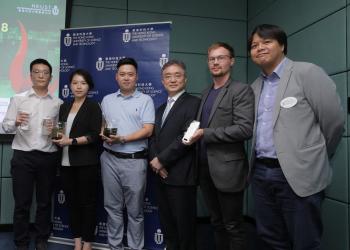
News
HKUST-Sino One Million Dollar Entrepreneurship Competition 2018 Sees Innovative Entrepreneurial Ideas
Three teams comprising HKUST students, alumni and their international peers have won over 100 contesting teams to gain the top three prizes of the HKUST-Sino One Million Dollar Entrepreneurship Competition 2018. They will compete with the finalists from six different cities in the Grand Final to be held at the University’s Fok Ying Tung Research Institute, Nansha in August.

News
HKUST Launches New Master Program in Public Policy and Reveals Report on I&T Development of Greater Bay Area
The Hong Kong University of Science and Technology (HKUST) is pushing forward its public policy research and education as the Institute for Public Policy (IPP) published today the first report on the integrative development of innovation and technology (I&T) in the Greater Bay Area, and the University is set to launch the city’s first two-year full-time taught postgraduate public policy program specialized in science, technology and environmental policy.

News
HKUST Discovers New Antibiotics Resistance Mechanism Paving the Way for Design of Antibiotics Against Superbugs
Researchers at The Hong Kong University of Science and Technology (HKUST) have identified for the first time the culprit behind the causing of broad-spectrum bacterial resistance to peptide antibiotics - widely perceived as the last-line of defense against antibiotic-resistant bacteria, opening a new direction to the design of new drugs in tackling superbugs.
The discovery – made by Chair Professor from the Division of Life Science Prof Qian Pei-Yuan and his fellow researchers, came in the best moment as the team has also discovered that this enzyme, which they identified as the cause of broad-spectrum bacteria resistance against peptide antibiotics, was actually found in not just a few, but many different strains of bacteria, sounding an alarm against persistent improper use of antibiotics.
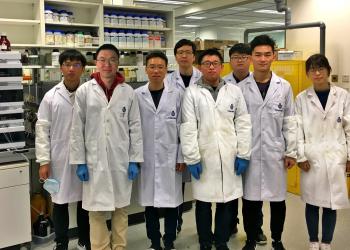
News
HKUST Scientists Find New Way to Produce Chiral Molecules which may Bring Safer and More Affordable Medicine
A research team from the Hong Kong University of Science and Technology (HKUST) has discovered a more efficient and eco-friendly way to produce a family of chiral molecules, which would potentially bring down the cost of chiral medicine and make them more accessible to all.
Over half of the approved drugs now in use in the world are chiral, which treats a wide range of conditions including cardiovascular, respiratory and gastrointestinal diseases. Many chiral drugs are top sellers including high-cholesterol medicine Lipitor, and antibiotic Amoxicillin. But production of chiral drugs are difficult and costly, as the production process is complicated and requires rare and expensive raw materials in general.
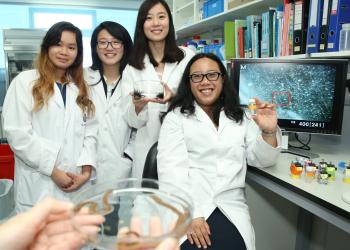
News
HKUST Researchers Identify Irreversible Adverse Effects of Microbeads on Marine Animals’ Growth and Development
A research team at the Hong Kong University of Science and Technology (HKUST) has demonstrated that the growth and development of two marine invertebrates – the pollution-tolerant slipper limpets and the commercially-harvested bristle worms (a common fish bait which recycles nutrients in the ecosystem) – are prone to suffer irreversible damage under exposure to high concentration of microbeads.

News
Research@HKUST Highlights Our World-Class Status
In our quarter century as a top academic institution, we have embarked upon an extraordinary journey in research. To this end, Research@HKUST is a must read for those seeking to learn more about the latest developments in our mission.
From structural biology, to urban sustainability, humanising robots, big data, disruptive innovation, and demystifying China’s finance, HKUST has demonstrated its research breadth in addressing global and societal challenges. Indeed, HKUST topped the most recent Research Assessment Exercise by the University Grants Committee (UGC) in Hong Kong, with 70 percent of HKUST’s submissions rated either “world leading” (four star) or “internationally excellent” (three star).






